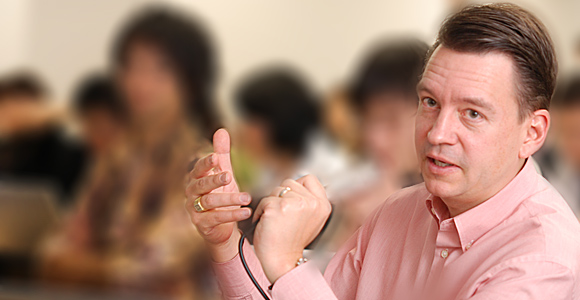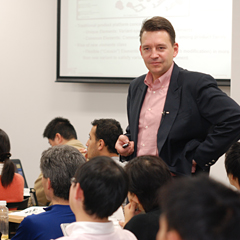Olivier L. de Weck

Innovative and synergistic solutions and
ideas could only emerge by creating
such an atmosphere of curiosity,
innovation and excellence.
Olivier L. de Weck, Ph.D.
Associate Professor
Engineering Systems Division and Department of Aeronautics & Astronautics, MIT
Three main objectives
The Active Learning Project Sequence (ALPS) is a capstone course and has three main objectives. First it serves as an integrative experience that allows the students to apply and integrate the knowledge they acquired in the SDM program and through their professional experiences in an active way. We guide the students through the lifecycle of a product or system development project in a systematic way while leaving a lot of room for creativity and fresh and unexpected outcomes. Second we encourage the students to work in mixed teams of people of different gender, age as well as technical and social backgrounds. This increasingly reflects the reality of a global economy and gives them a better appreciation for viewpoints other than their own. Third we want to stretch their minds and expose them to the newest theories and methods in system development by bringing in lecturers from Keio, MIT and Stanford and other institutions. All in all we want ALPS to be a very memorable experience with lots of learnings and hard work, fun and creativity, amazing innovations and achievements as well as friendships forged for life.
Topic of the year
 ALPS started as an experiment in 2008 and, quite frankly, neither Kos Ishii nor I were quite sure what to expect and whether it would work or not. You see ALPS is quite orthogonal to what the Japanese model of engineering education used to be. Classically there was a single professor explaining a theory and writing equations on a board with students - mainly men - copying the notes for later study. ALPS is completely different. We have mixed teams of men and women, engineers, journalists, finance majors, artists and so forth. In the first workshop we give them a societal challenge under the broad banner of the topic of the year. In the first year we tackled the problem of "Enhancing Senior Life in Japan" and saw an amazing range of projects from preventing social isolation to robotic travel assistants to enhancing personal mobility. In the second year we challenged the students to think about "Sustainable Community" in broad yet specific ways. The second, third and fourth workshop are all about analyzing the problem, identifying customer needs, generating ideas and concepts, down-selecting the most promising ones and developing prototypes that can be shown. Also important is the development of the business case to think both about costs and value generated. The highlights of ALPS are the final presentations and especially the elevator pitch competition. This event requires the students to explain the essence of their ideas in 60 seconds to a large audience. I am amazed how students that initially seem shy and overwhelmed have stepped up and grown beyond what seemed possible at the beginning.
ALPS started as an experiment in 2008 and, quite frankly, neither Kos Ishii nor I were quite sure what to expect and whether it would work or not. You see ALPS is quite orthogonal to what the Japanese model of engineering education used to be. Classically there was a single professor explaining a theory and writing equations on a board with students - mainly men - copying the notes for later study. ALPS is completely different. We have mixed teams of men and women, engineers, journalists, finance majors, artists and so forth. In the first workshop we give them a societal challenge under the broad banner of the topic of the year. In the first year we tackled the problem of "Enhancing Senior Life in Japan" and saw an amazing range of projects from preventing social isolation to robotic travel assistants to enhancing personal mobility. In the second year we challenged the students to think about "Sustainable Community" in broad yet specific ways. The second, third and fourth workshop are all about analyzing the problem, identifying customer needs, generating ideas and concepts, down-selecting the most promising ones and developing prototypes that can be shown. Also important is the development of the business case to think both about costs and value generated. The highlights of ALPS are the final presentations and especially the elevator pitch competition. This event requires the students to explain the essence of their ideas in 60 seconds to a large audience. I am amazed how students that initially seem shy and overwhelmed have stepped up and grown beyond what seemed possible at the beginning.
ALPS is one of the most visible and innovative parts of the SDM curriculum.
Helping create and run ALPS in its first few years has been a real challenge and privilege. I would like to acknowledge my friend Kos Ishii who was a driving force and architect of ALPS and the program award is rightfully dedicated to his memory. Now working with Kurt Beiter the ALPS faculty and staff we press on and look forward to ALPS 3 and the topic of "An Zen and An Shin: Safety and Security for Everyone. It took a lot of hard work and courage to create the new Keio University Graduate School of System Design and Management in 2008. This was an undertaking worthy of the 150 year anniversary of the University and its founder Yukichi Fukuzawa. ALPS is one of the most visible and innovative parts of the SDM curriculum. At MIT we are very proud of this development and view the Keio SDM program as a sister to our own SDM program. Increasingly the traditional divisions between engineers, managers, marketing experts and so on are becoming permeable and clearly Keio SDM is leading us into an exciting future. One of the highlights was the fact that the 2009 winning team , the "Roppongi Fruit and Vegetable Company" won two high-profile entrepreneurship competitions and will work towards establishing hydroponic food production in idle buildings in major cities in Japan. Such innovative and synergistic solutions and ideas could only emerge by creating such an atmosphere of curiosity, innovation and excellence.

